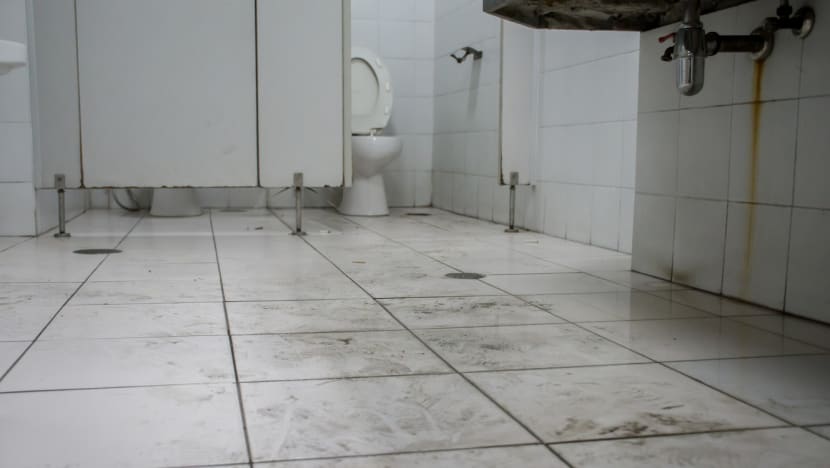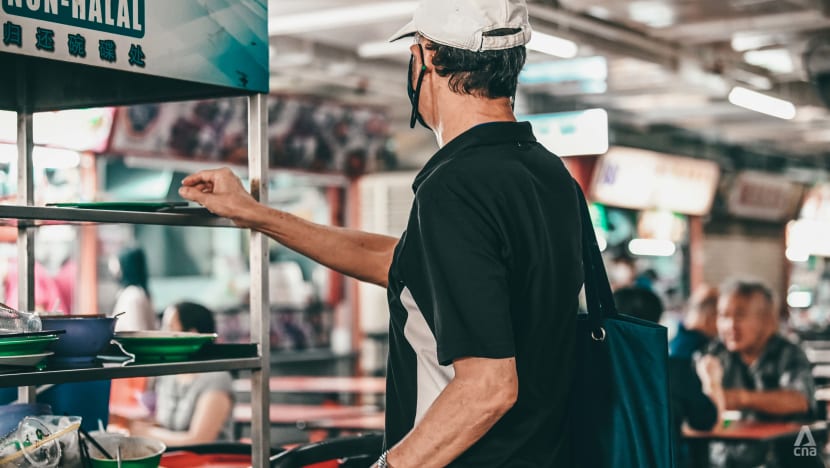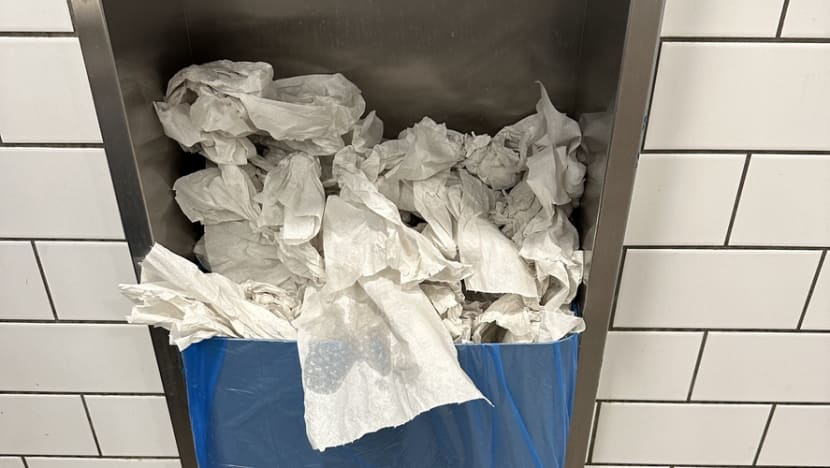Commentary: Tougher action needed for clean public toilets
Clean toilets in Singapore are possible, so long as there is a financial component to it, says Dr William Wan of the Singapore Kindness Movement.

File photo of wet and stained floors in a public toilet. (Photo: iStock/Prompilove)
SINGAPORE: It’s a running joke that Singapore isn’t a clean society: We are a cleaned society. A recent survey by Singapore Management University showed that there is some truth to that old trope.
The Public Cleanliness Satisfaction Survey 2022, conducted from July to October last year, saw 2,020 Singapore residents respond on public hygiene issues such as tray return and toilet cleanliness.
The authors, Singapore Management University (SMU) sociology professor Paulin Straughan and Institute of Policy Studies’ principal research fellow Dr Mathew Mathews, found that most respondents (99 per cent) believe that Singapore is a clean city, and that it’s mostly due to efficient cleaning services (90 per cent).
But should that be the case?

TRAY RETURN
One of the key findings in the survey was that most respondents (95 per cent) said that they returned their trays all the time. Furthermore, almost all (97 per cent) were aware that it is mandatory for diners at hawker centres, coffee shops and air-conditioned food courts to clear their dirty trays, crockery and litter after meals.
It’s a far cry from the 2019 iteration of the same survey, where 88 per cent of respondents said they returned their trays, but as many as 36 per cent were unclear if they had to do so.
Two years ago, in April 2021, I wrote in a CNA commentary that tougher action was needed to get diners to return trays, and suggested imposing fines or deterrents such as a modified Corrective Work Order for recalcitrants. After years of “softer” campaigns to encourage patrons to return their trays, it was time to take a more draconian approach, I said then.
As expected, there were grumblings and complaints (and barbed jokes about Singapore being a fine city), but with the spectre of COVID-19 looming, most Singaporeans understood that it was a necessary step to better public hygiene in our eateries.
In September that year, enforcement against table littering at hawker centres was rolled out, followed by coffee shops and food courts in January 2022.
That approach paid off.
More than 90 per cent of respondents in the public cleanliness survey said that table littering enforcement measures were useful as they ensured quick table turnover, reduced bird nuisances, prevented spread of diseases, established pro-social norms and encouraged diners to appreciate cleaners more.
In fact, a bigger proportion (93 per cent) were even supportive of the more stringent measures.
In other words, tray return worked because as a society, we decided that after years of using the carrot, the stick method was needed. The result: Cleaner tables, better public cleanliness.
PUBLIC TOILETS
What about public toilets then?
In the survey, 81 per cent of respondents reported feeling satisfied or very satisfied with toilets in general, with public toilets in shopping malls in the downtown or central business district areas yielding the highest satisfaction rates (98 per cent).
Critically, the least satisfactory toilets were in coffee shops (53 per cent) and hawker centres (63 per cent). Among the common complaints were bad odour and wet or stained floors.
However, dealing with toilets is very different from tray return.
For one, going to the toilet is something done in private, as opposed to tray return, which is in public view: If you leave your utensils behind after a meal, it’s obvious to others around that you have neglected to return the tray. Not so with toilets.
Moreover, people don’t go to coffee shops or hawker centres to use the toilet. No one lingers at the coffee shop: We eat, then leave. Using the facilities isn’t a draw.
Mall toilets, on the other hand, like shopping centre amenities, are designed to ensure customers stay as long as possible, thereby be inclined to shop more. That explains the high level of satisfaction of public toilets in downtown shopping malls.
That also proves that clean toilets in Singapore are possible, so long as there is a financial component to it. In other words, if we want coffee shop owners and hawker centre operators to fix wet, smelly toilets, the solution might lie in commercial viability.
PAY FOR CLEANER TOILETS?
Some have suggested subsidies for coffee shop owners to hire professional cleaners.
Michelle Tay, my colleague at Singapore Kindness Movement, told Mediacorp Channel 8’s Hello Singapore programme last week that while there is merit in that suggestion, coffee shop owners need to use these funds responsibly, whether it is to hire more cleaners or to install hand dryers or non-slip tiles.
In high traffic areas such as Maxwell Hawker Centre or People’s Park Complex, some public hawker toilets have undergone renovations (complete with Dyson hand dryers).
But even with infrastructure in place, the onus is on users to keep the facilities clean, she added. The most modern public toilet can still get dirty if users flick water on the floor or leave dirty tissues behind.
I have heard horror stories of kopitiam owners neglecting their toilet facilities because it is a cost centre. Soap, water, and toilet paper cost money, as the argument goes, so why encourage people to use it more? Subsidies may help in this area, but it still doesn’t address the underlying economic issue - clean toilets cost money.
Instead of using a carrot, what about the stick then? Take a leaf from tray return, and take a harder approach. Consider having toilets pass a weekly test, for example, failing which, the coffee shop and hawker centre would have to shut for a day of cleaning or be fined.
It sounds draconian but so did tray return measures when they were first mooted.
Let’s not forget that clean toilets are ultimately a public health issue. Patrons who cannot wash their hands after using the toilet because the faucet is broken or where there is no soap, may suffer unpleasant digestive consequences.
Worse, workers who use dirty toilets may end up causing a food poisoning epidemic. Such public health hazards can be prevented by stricter rules and enforcement.

A HOPEFUL NOTE
Where is the consumer’s role in all of this?
Toilet habits, as mentioned, is near-impossible to monitor without impinging on personal rights. Therefore, public education cannot slacken.
Since the first Keep Public Toilets Clean campaign in 1983, NEA has had multiple drives over the years urging users to Flush, Clean, Bin, Dry, culminating with the most recent Public Toilets Shouldn’t Be Scary video.
Progress hasn’t been constant. In 2020, Singapore Kindness Movement collaborated with Dr Rosie Ching at SMU on a nationwide study, whimsically named “Waterloo”. Her students interviewed 8,217 customers and hawkers about the state of toilets in coffee shops and food centres all over Singapore. They found that the toilets were dirtier than what was found in 2016.
There is room to hope, according to Prof Straughan.
One overlooked finding of the public cleanliness survey is this: When asked who was primarily responsible for the cleanliness of public toilets, 60 per cent responded that individual users were responsible. This was a 12 per cent increase from 48 per cent in 2021.
The remaining responses were cleaners (13 per cent), public toilets operators (18 per cent) or operators of premises where public toilets are located (9 per cent). Only 1 per cent of respondents felt that the government was responsible for the cleanliness of public toilets.
In other words, public education seems to be having an effect. Perhaps by pairing these “carrots” with a “stick” of legislation, cleaner public toilets in Singapore may be somewhat less of a pipe dream.
Dr William Wan is the General Secretary of the Singapore Kindness Movement.


















